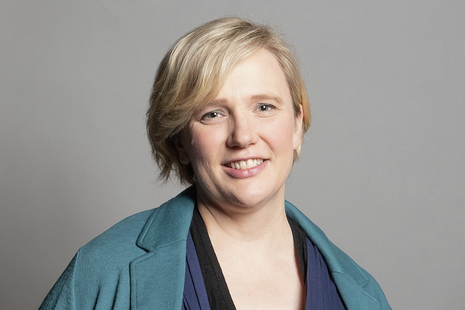‘I wasn’t special. I was just defiant’: Stella Creasy MP on sexual harassment at Cambridge
Stella Creasy MP discusses her experience as a student politician, Westminster culture, and why more mothers are needed in parliament

Content Note: discussion of sexual harassment and rape threats
It is not every day that you pick up the phone to an MP on the other end. Stella Creasy, Labour and Co-op MP for Walthamstow, is walking and talking, her children babbling excitedly in the background. Patient, lively, and good-humoured, she talks me through her experience of being a female student politician at Cambridge in the 1990s.
Creasy was given her offer to study Social and Political Science at Magdalene College in 1996, just eight years after the College first admitted women onto its undergraduate courses. Now an established Labour politician, Creasy uses her platform to voice concerns for women in politics and the wider workplace, from clarifying Parliament’s stance on maternity leave to campaigning for misogyny to be considered a hate crime.
“I don’t have the typical background of a politician who went here”
In a recent interview with GB News, Creasy described her experiences of harassment and misogynistic treatment during her time as an undergraduate, including one incident in which she was threatened with gang rape by male members of the college.
At the start of our conversation, she recalls an “endemic culture” of chauvinism at Magdalene during her time as an undergraduate: academics and students would mourn the days when just men studied at the College and wore black armbands as symbols of their resistance. While larger colleges can often reduce the dominance of a single ideology, Creasy notes that the small, close-knit environment of Magdalene enabled a group of men to intimidate and harass her without opposition. Since college staff and tutors personally knew those who threatened her, Creasy felt the college prioritised protecting their reputations over her welfare.
“I wasn’t special, I was just defiant,” Creasy says. “I angered them by not being willing to get in a relationship with one of them.” She states that the experience of intimidation made her feel reduced to a sexual object, and recalls how her harassers defaced her name on her accommodation board from ‘Stella Creasy’ to ‘Stella Easy’.
“Porters would fix it, and it would be done again. They didn’t think it was a big thing at the time. They thought it was just hijinks– just a laugh. This carried on for 18 months.”
Creasy believes that much of the sexual harassment she experienced was because she decided to run for a position in the Cambridge Union, and later for Labour Students.
Did these experiences influence her decision not to become a member of the Cambridge Union? “Just not my scene!” she laughs, explaining that she only went to one or two Union events, and was otherwise uninterested. “I don’t have the typical background of a politician who went here. I was just trying to focus on my degree and have a good time!”
“I also want to acknowledge that things have changed,” she adds. Since Creasy spoke out about her experiences, both Cambridge University and Magdalene College issued statements condemning the harassment she faced, listing the improvements they have made towards safeguarding and disciplinary action. In particular, Magdalene reaffirmed their ongoing support for the University’s ‘Breaking the Silence’ campaign, which enables students affected by sexual harassment to seek advice or to report the incident.
Is this enough to solve the issues of harassment and sexual misconduct at Cambridge University? “Not exactly”, Creasy says.
“There’s still a fear of putting your head above the parapet,” she says, citing the persistent fear among victims of the repercussions of reporting and challenging influential students, lecturers, or society chairs. Even if a student plucks up the courage, she describes the further worries about people thinking it’s not that big of a deal. Since tutors and academics offered little support, Creasy describes relying instead on her friends, both from fellow students and outside of Cambridge.
“There’s still a fear of putting your head above the parapet”
So what solution is there if any? Rather than requiring students to speak to their tutor or other members of their college when reporting harassment, Creasy advocates an independent body for reporting and investigating incidents of misconduct across all colleges.
“People can come forward and make a complaint, where the focus will be on the incident, not the individuals in question. Having an independent process helps treat it with the seriousness it deserves, whilst also giving confidence to all involved that the process is fair,” she explains.
Are issues of misogyny in parliament at least partly rooted in a culture encouraged at Oxbridge or perhaps even earlier, in public schools? “Well, I think it has its roots in the patriarchy! Westminster itself doesn’t make you abuse and harass people.” Instead, she locates the root of the issue in “places where power and influence are concentrated”, that encourage the “congregation of people who are abusive”.
“Parliament was set up for white men of privilege. There comes a point at which this privilege twists into poison.” She pauses for a moment. “And where people believe they can act without consequences. But it benefits everyone, including those white men of privilege, to have a diverse group of people working together. It can only be a good thing.”
“Parliament was set up for white men of privilege”
This April, 70 complaints related to 56 MPs were sent to parliament’s complaints scheme for allegations of sexual misconduct. The chair of the women and equalities committee, Caroline Nokes MP, warned in the committee’s report that young female candidates risk being deterred by a political environment in which exclusion and harassment appear inevitable.
“It’s not inevitable.” Creasy says firmly. Equally, she says it is “not their responsibility to change it. Their responsibility is to show their passion for social change, and our responsibility – those of us already in politics – is to make sure they don’t get held back.”
Creasy’s current efforts aim to address the narrow proportion of women in Parliament. Her campaign ‘MotheRED’ was set up in March 2022, to shed light on the practical obstacles that prevent mothers from participating in politics, from childcare costs to inflexible working hours. The crowd-funded campaign will support eighteen mothers to stand for the 2024 general election through a financial grant.
Creasy emphasises her commitment to continue advocating for working women. “Being in Westminster is a privilege. Being at Cambridge is a privilege,” she says. “And you can sit on the side-lines and point out everything that’s wrong, or you can get stuck in.”
I can hear the smile in her voice as she says: “I’ve always known what I prefer.”
 News / Judge Business School advisor resigns over Epstein and Andrew links18 February 2026
News / Judge Business School advisor resigns over Epstein and Andrew links18 February 2026 News / Hundreds of Cambridge academics demand vote on fate of vet course20 February 2026
News / Hundreds of Cambridge academics demand vote on fate of vet course20 February 2026 News / Petition demands University reverse decision on vegan menu20 February 2026
News / Petition demands University reverse decision on vegan menu20 February 2026 News / CUCA members attend Reform rally in London20 February 2026
News / CUCA members attend Reform rally in London20 February 2026 News / Gov grants £36m to Cambridge supercomputer17 February 2026
News / Gov grants £36m to Cambridge supercomputer17 February 2026










